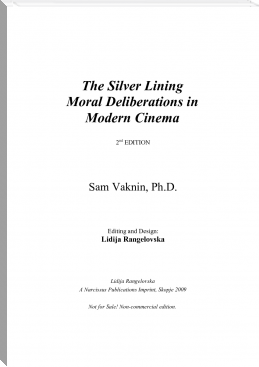The Art of War, Zi Sun [best short novels .txt] 📗

- Author: Zi Sun
- Performer: 0486425576
Book online «The Art of War, Zi Sun [best short novels .txt] 📗». Author Zi Sun
them nothing in the matter of victory. I say then
that victory can be achieved.
22. Though the enemy be stronger in numbers, we may
prevent him from fighting. Scheme so as to discover
his plans and the likelihood of their success.
23. Rouse him, and learn the principle of his
activity or inactivity. Force him to reveal himself,
so as to find out his vulnerable spots.
24. Carefully compare the opposing army with your own,
so that you may know where strength is superabundant
and where it is deficient.
25. In making tactical dispositions, the highest pitchyou can attain is to conceal them; conceal your dispositions,
and you will be safe from the prying of the subtlest spies,
from the machinations of the wisest brains.
26. How victory may be produced for them out of the enemy’s
own tactics—that is what the multitude cannot comprehend.
27. All men can see the tactics whereby I conquer,
but what none can see is the strategy out of which victory
is evolved.
28. Do not repeat the tactics which have gained
you one victory, but let your methods be regulated
by the infinite variety of circumstances.
29. Military tactics are like unto water; for water in its
natural course runs away from high places and hastens downwards.
30. So in war, the way is to avoid what is strong
and to strike at what is weak.
31. Water shapes its course according to the nature
of the ground over which it flows; the soldier works
out his victory in relation to the foe whom he is facing.
32. Therefore, just as water retains no constant shape,
so in warfare there are no constant conditions.
33. He who can modify his tactics in relation to his
opponent and thereby succeed in winning, may be called
a heaven-born captain.
34. The five elements (water, fire, wood, metal, earth)
are not always equally predominant; the four seasons make
way for each other in turn. There are short days and long;
the moon has its periods of waning and waxing.
VII. MANEUVERING
1. Sun Tzu said: In war, the general receives his
commands from the sovereign.
2. Having collected an army and concentrated his forces,
he must blend and harmonize the different elements thereof
before pitching his camp.
3. After that, comes tactical maneuvering,than which there is nothing more difficult.
The difficulty of tactical maneuvering consists
in turning the devious into the direct, and misfortune into gain.
4. Thus, to take a long and circuitous route,
after enticing the enemy out of the way, and though starting
after him, to contrive to reach the goal before him,
shows knowledge of the artifice of DEVIATION.
5. Maneuvering with an army is advantageous;
with an undisciplined multitude, most dangerous.
6. If you set a fully equipped army in march in order
to snatch an advantage, the chances are that you will be
too late. On the other hand, to detach a flying column
for the purpose involves the sacrifice of its baggage
and stores.
7. Thus, if you order your men to roll up their
buff-coats, and make forced marches without halting day
or night, covering double the usual distance at a stretch,
doing a hundred LI in order to wrest an advantage,
the leaders of all your three divisions will fall into
the hands of the enemy.
8. The stronger men will be in front, the jaded
ones will fall behind, and on this plan only one-tenth
of your army will reach its destination.
9. If you march fifty LI in order to outmaneuver
the enemy, you will lose the leader of your first division,
and only half your force will reach the goal.
10. If you march thirty LI with the same object,
two-thirds of your army will arrive.
11. We may take it then that an army without its
baggage-train is lost; without provisions it is lost;
without bases of supply it is lost.
12. We cannot enter into alliances until we are
acquainted with the designs of our neighbors.
13. We are not fit to lead an army on the march
unless we are familiar with the face of the country—its
mountains and forests, its pitfalls and precipices,
its marshes and swamps.
14. We shall be unable to turn natural advantage
to account unless we make use of local guides.
15. In war, practice dissimulation, and you will succeed.
16. Whether to concentrate or to divide your troops,
must be decided by circumstances.
17. Let your rapidity be that of the wind,
your compactness that of the forest.
18. In raiding and plundering be like fire,is immovability like a mountain.
19. Let your plans be dark and impenetrable as night,
and when you move, fall like a thunderbolt.
20. When you plunder a countryside, let the spoil be
divided amongst your men; when you capture new territory,
cut it up into allotments for the benefit of the soldiery.
21. Ponder and deliberate before you make a move.
22. He will conquer who has learnt the artifice
of deviation. Such is the art of maneuvering.
23. The Book of Army Management says: On the field
of battle, the spoken word does not carry far enough:
hence the institution of gongs and drums. Nor can ordinary
objects be seen clearly enough: hence the institution
of banners and flags.
24. Gongs and drums, banners and flags, are means
whereby the ears and eyes of the host may be focused
on one particular point.
25. The host thus forming a single united body,
is it impossible either for the brave to advance alone,
or for the cowardly to retreat alone. This is the art
of handling large masses of men.
26. In night-fighting, then, make much use of signal-fires
and drums, and in fighting by day, of flags and banners,
as a means of influencing the ears and eyes of your army.
27. A whole army may be robbed of its spirit;
a commander-in-chief may be robbed of his presence of mind.
28. Now a soldier’s spirit is keenest in the morning;
by noonday it has begun to flag; and in the evening,
his mind is bent only on returning to camp.
29. A clever general, therefore, avoids an army when
its spirit is keen, but attacks it when it is sluggish
and inclined to return. This is the art of studying moods.
30. Disciplined and calm, to await the appearanceof disorder and hubbub amongst the enemy:—this is the art
of retaining self-possession.
31. To be near the goal while the enemy is still
far from it, to wait at ease while the enemy is
toiling and struggling, to be well-fed while the enemy
is famished:—this is the art of husbanding one’s strength.
32. To refrain from intercepting an enemy whosebanners are in perfect order, to refrain from attacking
an army drawn up in calm and confident array:—this
is the art of studying circumstances.
33. It is a military axiom not to advance uphill
against the enemy, nor to oppose him when he comes downhill.
34. Do not pursue an enemy who simulates flight;
do not attack soldiers whose temper is keen.
35. Do not swallow bait offered by the enemy.
Do not interfere with an army that is returning home.
36. When you surround an army, leave an outlet free.
Do not press a desperate foe too hard.
37. Such is the art of warfare.
VIII. VARIATION IN TACTICS
1. Sun Tzu said: In war, the general receives
his commands from the sovereign, collects his army
and concentrates his forces
2. When in difficult country, do not encamp. In country
where high roads intersect, join hands with your allies.
Do not linger in dangerously isolated positions.
In hemmed-in situations, you must resort to stratagem.
In desperate position, you must fight.
3. There are roads which must not be followed,
armies which must be not attacked, towns which must
not be besieged, positions which must not be contested,
commands of the sovereign which must not be obeyed.
4. The general who thoroughly understands the advantagesthat accompany variation of tactics knows how to handle
his troops.
5. The general who does not understand these, may be well
acquainted with the configuration of the country, yet he
will not be able to turn his knowledge to practical account.
6. So, the student of war who is unversed in the art
of war of varying his plans, even though he be acquainted
with the Five Advantages, will fail to make the best use
of his men.
7. Hence in the wise leader’s plans, considerations of
advantage and of disadvantage will be blended together.
8. If our expectation of advantage be tempered in
this way, we may succeed in accomplishing the essential
part of our schemes.
9. If, on the other hand, in the midst of difficulties
we are always ready to seize an advantage, we may extricate
ourselves from misfortune.
10. Reduce the hostile chiefs by inflicting damageon them; and make trouble for them, and keep them
constantly engaged; hold out specious allurements,
and make them rush to any given point.
11. The art of war teaches us to rely not on the
likelihood of the enemy’s not coming, but on our own readiness
to receive him; not on the chance of his not attacking,
but rather on the fact that we have made our position unassailable.
12. There are five dangerous faults which may affect
a general:
(1) Recklessness, which leads to destruction;
(2) cowardice, which leads to capture;
(3) a hasty temper, which can be provoked by insults;
(4) a delicacy of honor which is sensitive to shame;
(5) over-solicitude for his men, which exposes him
to worry and trouble.
13. These are the five besetting sins of a general,
ruinous to the conduct of war.
14. When an army is overthrown and its leader slain,
the cause will surely be found among these five
dangerous faults. Let them be a subject of meditation.
IX. THE ARMY ON THE MARCH
1. Sun Tzu said: We come now to the question of
encamping the army, and observing signs of the enemy.
Pass quickly over mountains, and keep in the neighborhood
of valleys.
2. Camp in high places, facing the sun. Do not climb
heights in order to fight. So much for mountain warfare.
3. After crossing a river, you should get far away
from it.
4. When an invading force crosses a river in its
onward march, do not advance to meet it in mid-stream.
It will be best to let half the army get across,
and then deliver your attack.
5. If you are anxious to fight, you should not go
to meet the invader near a river which he has to cross.
6. Moor your craft higher up than the enemy, and facing
the sun. Do not move up-stream to meet the enemy.
So much for river warfare.
7. In crossing salt-marshes, your sole concernshould be to get over them quickly, without any delay.
8. If forced to fight in a salt-marsh, you should
have water and grass near you, and get your back
to a clump of trees. So much for operations in salt-marches.
9. In dry, level country, take up an easily accessible
position with rising ground to your right and on your rear,
so that the danger may be in front, and safety lie behind.
So much for campaigning in flat country.
10. These are





Comments (0)